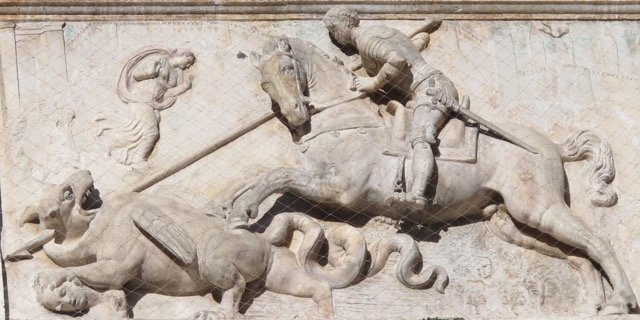The current issue of ‘The Spenser Review’ brings together a number of new and already established features of the journal which we plan to develop in the next few issues. We are delighted to be able to include Jeffrey Griswold’s essay ‘The False Florimell and Non-Human Consent’, winner of the inaugural Anne Lake Prescott graduate studies paper prize. Many congratulations are due to the author who was chosen by a distinguished panel of Spenser judges. Read more…
The False Florimell and Nonhuman Consent
This paper is derived from my dissertation, ‘The Political Animal: Early Modern Literature and Human Exceptionalism’, which argues for the importance of species difference to the political thought of the English Renaissance. Early modern poets, dramatists, and philosophers used Aristotle’s claim that humans are the ‘political animal’ to frame a novel kind of human exceptionalism. Whereas Aristotle grounds our communal nature in the human powers of language, reason, and justice, early modern thinkers depart from the Politics, defining human community through our deficiencies. Read more…
The year was 1977, and I was at the MLA in Chicago interviewing for jobs. One of my mentors at U. C. Irvine, Robert Montgomery, introduced me to A. C. Hamilton, who, upon learning that I was writing a Spenser dissertation, told me he thought Spenser was pretty much played out, and the real action going forward would be in Sidney Studies. Read more…
The subject of this article is Timias — Prince Arthur’s ‘dearly loued Squire’ (I.vii.37.1). Very little has been written about Timias, despite the fact that he appears in five of the six completed books of the Faerie Queene (I, II, III, IV and VI). This is hardly surprising; he does not have a book named after him, his appearances in the poem are sporadic and he tends to orbit the main events of the narrative, existing on the periphery of things rather than dominating the action. When he is the focus on attention it is often just in the light of one very specific historical allegory involving Raleigh. Read more…

Bas relief from the exterior of the Scuola San Giorgio degli Schiavoni in Venice. Photo courtesy of Roger Kuin.
- Hazel Wilkinson, Edmund Spenser and the Eighteenth-Century Book —
- Judith H. Anderson, Spenser’s Narrative Figuration of Women in The Faerie Queene —
- Marie-Alice Belle and Line Cottegnies, eds., Robert Garnier in Elizabethan England: Mary Sidney Herbert’s Antonius; Thomas Kyd’s Cornelia —
- Victoria Brownlee, Biblical Readings and Literary Writings in Early Modern England, 1558-1625 —
- Christopher Cannon, From Literacy to Literature: England, 1300-1400 —
- Chris Barrett, Early Modern English Literature and the Poetics of Cartographic Anxiety —
- Duncan Fraser and Andrew Hadfield, eds., Gentry Life in Georgian Ireland: The Letters of Edmund Spencer (1711-1790) —
- Andrew Zurcher, Twelve Nights —
- Patrick Cheney, English Authorship and the Early Modern Sublime: Spenser, Marlowe, Shakespeare —
- Kathleen Miller and Crawford Gribben, eds., Dublin: Renaissance City of Literature —
- Katherine West Scheil, Imagining Shakespeare’s Wife: The Afterlife of Anne Hathaway —
